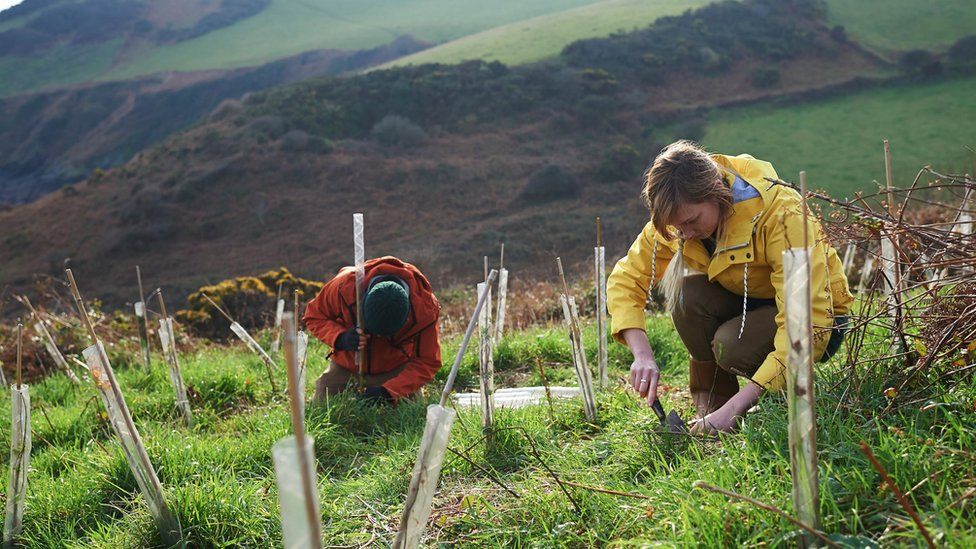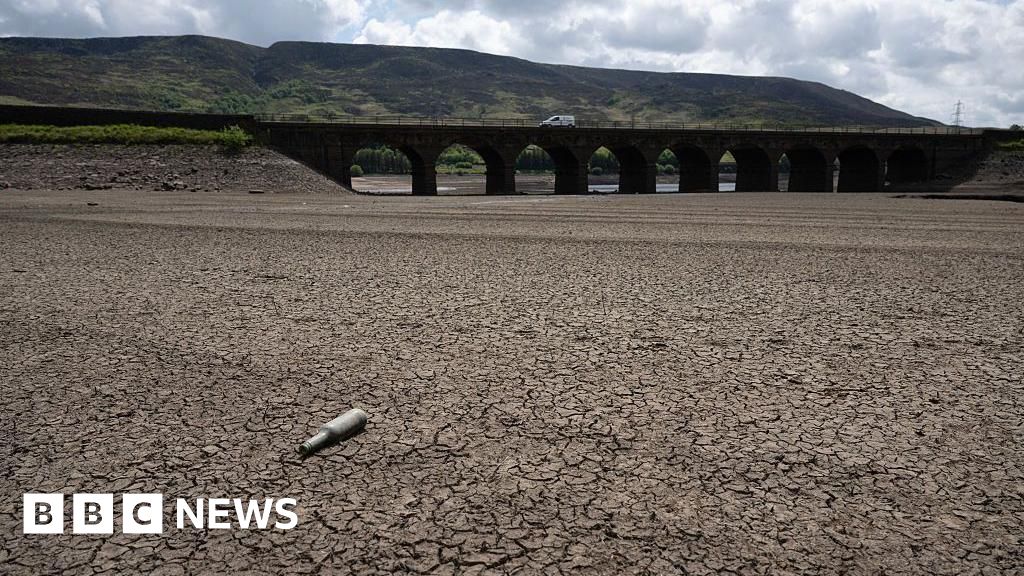ARTICLE AD BOX
 Image source, Getty Images
Image source, Getty Images
Plant more trees - one of the report's recommendations
By Justin Rowlatt and Greg Brosnan
BBC News Climate and Science
Government backing for new oil and coal, airport expansion plans and slow progress on heat pumps show that the UK has lost its leadership on climate issues, a government watchdog warns.
The Climate Change Committee (CCC) described government efforts to scale up climate action as "worryingly slow".
It was "markedly" less confident than a year ago that the UK would reach its targets for cutting carbon emissions.
The government said it was committed to its climate targets.
Committee chairman Lord Deben, a former Conservative environment minister, was particularly critical of the government's policy on new coal and oil projects.
The decision to approve the UK's first new deep coal mine in 30 years in Cumbria last December was "total nonsense", he told the BBC.
Lord Deben was also damning about plans for a major new oilfield off the coast of Scotland. Approval for Rosebank, which could produce an estimated 300 million barrels of oil in its lifetime, is expected soon.
"How can we ask countries in Africa not to develop oil?" Lord Deben said. "How can we ask other nations not to expand the fossil fuel production if we start doing it ourselves?"
Image source, Getty Images
Image caption,The government proposed the first new coal mine in 30 years in Whitehaven, Cumbria
The UK has set legally binding targets to cut greenhouse gas emissions to net zero by 2050, meaning the country will no longer contribute any additional greenhouse gases to the atmosphere.
At the COP26 UN climate conference in Glasgow in 2021 then prime minister Boris Johnson vowed to cut emissions by 68% on 1990 levels by the end of the decade.
The CCC report warned "continued delays in policy development and implementation" meant reaching them was "increasingly challenging".
The Committee highlighted a "lack of urgency" across government and a "worrying hesitancy" by ministers to lead on the climate issue.
'No magic button'
Minister of State for Energy Security and Net Zero Graham Stuart said in response to the report that the government had met all its carbon targets to date and was confident of doing so in the future.
Responding to criticism for continued support for oil and gas projects, he stressed that despite an unprecedented role for renewables, the UK would remain dependent on these sources for power generation for the foreseeable future.
"There is no button I can press tomorrow, and as we will be dependent on oil and gas for decades to come, even as we move to net zero, it makes sense that we should produce it here," he told journalists.
Regarding the new coal mine in Cumbria, he stressed that it would produce coking coal for making steel, not for energy production and that there was currently no alternative.
Rebecca Newsom, head of politics for Greenpeace UK called the report "a pitiful catalogue of Rishi Sunak's climate failures".
"This report exposes the catastrophic negligence shown by this government which has left Britain with higher bills, fewer good jobs, our energy security weakened, and the climate emergency unaddressed," said Labour's Shadow Climate and Net Zero Secretary Ed Miliband.
The chair of the COP26 summit, Alok Sharma, agreed the UK was at risk of losing what he called its "international reputation and influence on climate".
He said the country risked falling behind without a response to initiatives like the US's vast subsidies for green industries.
"Resting on our laurels is definitely not the answer industry is seeking," he said, one of the sharpest criticisms the Conservative MP has made of the government's climate policy.
More needs to be done to encourage us all to install heat pumps, insulate our homes, reduce how much meat we eat and fly less, the Committee said.
At the same time, it said, the switch to renewable power needs to be ramped up, industry needs more help to decarbonise and there needs to be a huge increase in the numbers of trees planted and the speed of peatland restoration.
The report acknowledged that glimmers of the Net Zero transition can be seen in growing sales of electric cars and the growing renewable power sector.
But it warned the government continues to rely on unproven technological solutions rather than "more straightforward" encouragement of people to reduce high-carbon activities.
Image source, Getty Images
Image caption,The report criticised plans for new airport expansion, saying we should be encouraged to fly less
The Committee says the government should be doing more to encourage us to fly less rather than relying on the development of sustainable fuels to reduce the carbon emissions from aviation, for example.
It pointed out that lots of UK airports are planning to expand capacity despite a CCC recommendation that there should be no net airport expansion. Seven out of the 10 major UK airports have plans to expand, according to BBC research.
Lord Deben, whose second and final term as chair of the CCC ends this month, said that one of the government's biggest failures was not putting net zero at the heart of the UK's planning system.
"If you pass laws in order to do something and then don't provide the means, then you're failing," he told the BBC.
He said he was sad his final report "does not show satisfactory progress".
UK greenhouse gas emissions have fallen 46% from 1990 levels, the CCC says, largely thanks to a massive reduction in the use of coal for electricity and the growth of the renewable power sector.

 1 year ago
49
1 year ago
49








 English (US) ·
English (US) ·